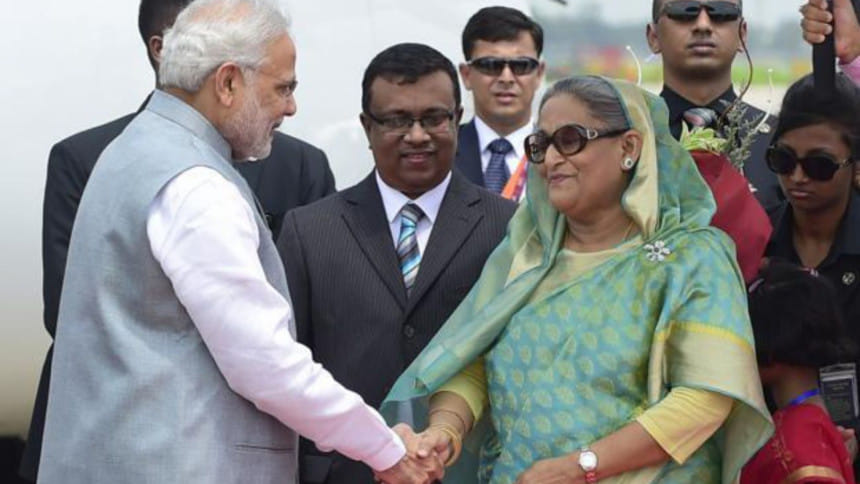Balancing Bangladesh's foreign policy

The relationship between a smaller and a larger neighbourly state, as also between a weaker and stronger one, is often tricky on both sides. Though not always, it requires greater dexterity on the smaller protagonist. This is because more "power" tends to reside with the larger, which is also usually the stronger partner.
The French philosopher Raymond Aron has defined "power" in international relations as the "capacity of a political unit to impose its will upon others". When one party enjoys such capability, it would be normal for the others to endeavour to erode it. Or at least tame it, in a way so as not to continuously have to play second fiddle to it.
With regard to smaller state options, political theorists have sought to delineate a pattern, to better understand, appreciate and predict it. Regionally, one is what the Scandinavian writer Erling Bjol called the "pilot-fish behaviour". It implies tacking close to the shark to avoid being eaten. Finland's relations with the Soviet Union to him was an example. A second option would be for the smaller power to go outside the region and enmesh itself in a web of international linkages, drawing strength from beyond the region to redress the regional imbalance. Just as Pakistan sought to do during the cold war by building alliances with the west to counter India. Third, over half a century ago, the British political author Martin Wight stated that weaker states prefer greater international order as a protective measure, a fact that remains valid to this day. Finally, small and weak states have a penchant for joining multilateral bodies in order to seek security in greater numbers, as also to build a stake for others in their sovereignties.
These elements were factored into Bangladesh's behaviour pattern in the regional and international matrix from its very inception as an independent country in December 1971. This was done both wittingly, and at times, unwittingly. Quite often, foreign policies are not formulated by cool-headed rational thinking. More often, for smaller and weaker states in particular, it becomes a series of tactical reactions to global situations rather than a strategic response as a product of careful calculations. In other words, it tends to be reactive rather than pro-active. The challenge is to balance both in a way that the international environment is rendered into a supportive backdrop to facilitate domestic good governance, development and prosperity.
Bangladesh's nascence came with some additional peculiarities. It was a rare case of secession, a recognised member of the United Nations breaking up into two. This was at variance with the existing global club rules. Secondly, Bangladesh was totally "India-locked", just as some countries are "land-locked", which made "Indo-centrism" an inescapable feature of its policies. When Bangabandhu Sheikh Mujibur Rahman returned from Pakistani incarceration in January 1972, his government had two aspirations which formed ever since the core of foreign policy. One was the strengthening of the young nation's security and sovereignty, and the other was the quest for resources for development. The aspirations were co-terminus rather than mutually exclusive. Both cases demanded the building of extra-regional linkages. Foreign policy rested on four pillars: one, the (then) superpowers; two, the Islamic Middle East; three, China, and four, international organisations (the United Nations, and GATT, later turned into the World Trade Organization). Four and a half decades down the line, with Sheikh Hasina at the helm, the broad parameters of Bangladesh's behaviour remain the same—with some variations to accommodate the changes in the ethos of both Bangladesh and India.
Bangladesh was born with massive support from India. That was nearly five decades ago. Both societies have changed enormously since then. Bangladesh is by no means the "basket case" that Henry Kissinger had once the temerity to describe it as. It is about to graduate into the list of middle-income countries and its social indices have surpassed in progress many of India's. Still, its infrastructures remain weak, its institutions inadequately developed, and its intellectual resources not optimally utilised. While the essence of national identity remains secular, external linkages have also fed tendencies that in some have led to the encouragement of fundamentalist thought-processes, though not alarmingly. India has, of course, progressed into a power to be reckoned with globally. Still, there are swathes of poverty that in some parts exceed that of Sub-Saharan Africa. But one significant change has been the ascendency of majoritarian sentiments, reflected in the concept of Hindutva espoused by the Bharatiya Janata Party (BJP). According to Shashi Tharoor, an Indian scholar-politician, it could alter the nature of Indian nationhood, eroding its secular and even constitutional character. This could have an impact on the mind-set of Bangladeshis, who are overwhelmingly Muslims. We may like to believe that the largest country in the region should also have the largest heart. But then, we must also recognise realities of structural constraints and that policies are not necessarily a function of generosity.
All this render very complex the manner in which Bangladesh authorities should organise themselves to deal with India. First, India cannot be seen as a single entity. There is the New Delhi government led by Prime Minister Narendra Modi of the BJP, but at times for Dhaka, Delhi is hanooz dur ast, "much too far". Modi is powerful, but is also constrained by the domestic political compulsions. These limitations are often exacerbated by interests of the Indian states that surround Bangladesh, like West Bengal, Assam, Meghalaya and the like. Also, there are pressure groups like the right-wing Rashtriya Sevak Sangha (RSS), the champions of Hindutva, the intellectuals and culture-gurus, the regional parties, the oftentimes shrill Indian media, and so forth. Graham Allison, describing American foreign policy-making, has broadly extrapolated that policy outcomes are often the result of competition between pressure-groups, which by logical definition would make policies "irrational".
So, for Bangladeshi policymakers, India should be seen as an amalgam of many elements, often with conflicting views. Secondly, Bangladeshi policymakers need to be aware that the existing global "order", which America had helped shape, is giving way to a new "disorder", which ironically is also being emplaced at the initiatives of America. It is undermining multilateral institutions like the United Nations (UN) and the WTO. To be specific, we cannot bring our multilateral linkages into determining our relations with India. The "decline" of America is being accompanied by the "rise" of what Fareed Zakaria has called "the rest". Changes in international norms, as at times in economics, are often cyclical. So, as before, we are seeing the burgeoning importance of individual nation-states like China. It would also be in consonance with the ideas of my intellectual mentor, Professor Hedley Bull, often seen as the father of Anglo-Saxon school of international relations, who had held that state-systems have come to stay. This would propel into play theories like "balance of power" of the classical nineteenth century, whereby we may need to create a set of bilateral linkages to enhance our negotiating capabilities in league with those with whom we share commonalities of interests.
It may seem like a tall order. But Bangladesh is blessed with high diplomatic thought-leadership skills. This is a part of Bangladesh's non-technological or intellectual resources. In the past during the Bangabandhu- era, against many odds, Bangladesh was able to establish itself firmly in the comity of nations. At present, during his daughter's stewardship, we have a new genre of diplomats who have the requisite potentials. Of course there is a need to further sharpen and hone such capabilities with a view to greater capacity-building. For instance, apart from key diplomatic agents appropriately located in the field abroad, there should be adequate "back-stopping" in the line-Ministry itself to adopt requisite pro-active initiatives and adequately respond to evolving situations in the neighbourhood. This should be resourced as necessary. Think-tanks and the vast available thought-capacity existing in the community must be adequately tapped, as one sees done in Singapore and elsewhere. For as is the case with Singapore, how Bangladesh relates to the world is critical to its destiny, its consolidation as a strong nation-state, and its progress and prosperity.
Dr Iftekhar Ahmed Chowdhury is a former foreign adviser to a caretaker government of Bangladesh and is currently Principal Research Fellow at the Institute of South Asian Studies, National University of Singapore.

 For all latest news, follow The Daily Star's Google News channel.
For all latest news, follow The Daily Star's Google News channel. 



Comments